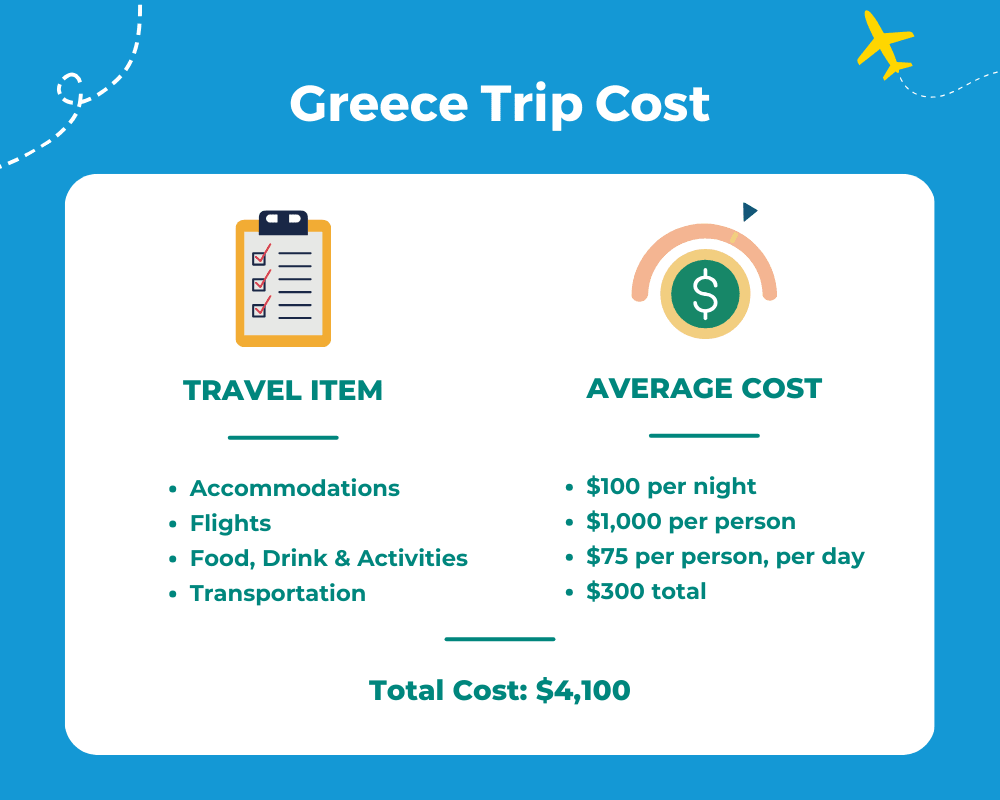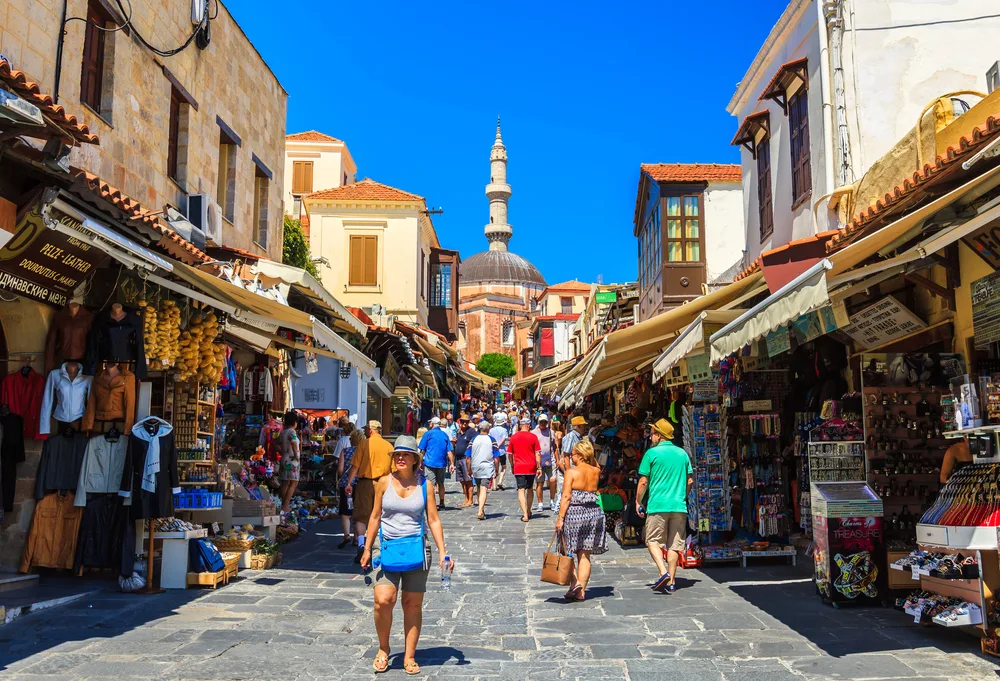What's the average trip to Greece cost?
A trip to Greece costs around $4,100 for two people for a week, encompassing accommodation at $100 per night, flights averaging $1,000 per person, and daily expenses for food, drink, and activities at $75 per person.
Transportation within Greece adds up to $300. While this makes Greece a moderately priced European destination, strategic planning and cost-saving tips can help manage expenses effectively.
Greece is a land of mythology and mystery, of ancient origins and modern cultures. It has been the subject of news, demonstrations, and economic hardship in recent years. It is also the home of ruins, music, whitewashed walls and blue roofs, and baklava.
Like most places, in other words, it’s a mixed bag. That’s only as a local, however. As a tourist, it’s one of the most wonderful places in the world to visit. From its shining seas to its tree-covered mountains, Greece is one of the world’s premier travel destinations.
Indeed, it has rebounded quite significantly from the COVID flatline the world’s tourism industry experienced across the board.
“In the period January-August 2023, 17.4 million international air arrivals were recorded, surpassing the levels of January-August 2022, showing an increase of 12.4% / +1.9 million arrivals,” says the Greek Reporter. “Compared to the period January-August 2019, the increase is estimated at 11%.”
All those people must know something, right? In other words, if you’re thinking about going to Greece for a week as a solo traveler, one half of a whole, with a friend, or with a group, it’s a good choice … but money still matters.
Average Trip to Greece Cost in 2025

An average one-week trip to Greece for two people will cost around $4,100:
- Average Accommodation Cost: $100 per night
- Average Flight Cost: $1,000 per person
- Food, Drink & Activities: $75 per person, per day
- Transportation: $300 total
- Total Cost: $4,100
A trip to Greece won’t break the bank, but it’s not the most affordable trip you’ll find. It is still in Europe, after all.
Greece Trip Cost: Average by Item

Anastasios71/Shutterstock
The average trip to Greece cost is just that: an average. It will go up or down depending on when you travel, where you fly into, where you stay, who you travel with, what you eat, if you take tours, and what your overall desired level of luxury is.
That said, the following figures will give you a great starting point for figuring out your trip to Greece, so dive on in!
Accommodation Costs
Happily, accommodations are quite reasonable in Greece. You can get a nice cheap hotel with views of the Acropolis and few amenities (though still comfortable) for about $50 in the winter and $75 in the summer. If you want to stay in a big-name hotel or at a resort, plan to spend between $150 and $200.
Many people choose to enjoy a few nights at a resort, then choose budget accommodations the rest of the time. Assuming you do this or just choose middle-of-the-road prices, $100 per night for two people is a totally reasonable amount to budget.
Flight Costs
Getting to Greece is shorter for those on the East Coast, for the obvious reason that it’s 5-6 hours of flying time closer to Europe. However, that’s not reflected in the costs, which are fairly reasonable from anywhere in the United States.
Flights from New York City to Athens, for instance, will range from about $700 to $900 round trip, while from LA to Athens are closer to $600 or $800. (Note that if you want to consider other factors than time and cost, you can now look at emissions as well.)
Flights within Greece, such as between Athens and Thessaloniki, are between $100 and $150 round trip. Overall, if you’re traveling from the US and taking one domestic flight in Greece, plan to spend about $850 on average.
If you are hopping from a regional airport to a big hub, plan to spend another $100 to $200 per person, for a total of about $1,000 on average for flights, per person.
Food, Drink & Activity Costs

RHODOS ISLAND, GREECE- JUNE 13: Many tourists visiting and shopping at market street in old town Rhodos, Greece on June 13, 2015. Shopping street leads to famous landmark of Suleymaniye Mosque/Littleaom/Shutterstock
Like accommodations and flights, food and activities in Greece are fairly reasonable. The cost of living there is less pricey than the rest of Europe. For instance, you’ll pay about $4 for a cappuccino and $.60 for a bottle of water.
A loaf of fresh bread is about $1.25 and a pound of cheese is $6.50 or so. Eating at markets and grocery stores is a delicious way to spend your time in Greece, so there’s really no need to eat at a restaurant very often.
If you choose to do so, plan to pay about $17 for a meal at an inexpensive restaurant or $30 at a nice one. Drinks are fairly inexpensive as well, with domestic beer clocking in around $4.50 and imported versions around $5.50.
Wine and mixed drinks are also quite reasonable, but watch yourself when you’re out partying: drink spiking and petty theft are common in Greece. For activities, there’s little need to go on tours if you don’t want to. You can purchase tickets to all the ruins and tour them yourself.
For instance, you can get a ticket to the Acropolis for 20 euros in summer and 10 in winter, or a combination pass (30 euros year round) that will get you into the Ancient Agora, the Roman Agora, Hadrian’s Library, the Temple of Olympian Zeus, and Aristotle’s School, among other attractions.
It’s a great way to save money and skip lines! Overall, assuming you stick to affordable eating, take only one expensive tour (for instance, an all-day boat tour for $150), you can easily enjoy yourself for $75 per person, per day.
Transportation Costs
Transportation in Greece can get expensive if you’re not careful. Taxis, for example, aren’t cheap. You’ll pay a base fee of several dollars simply to climb into a cab, after which it can cost as much as a euro per kilometer.
That means a 10-kilometer (6-mile) trip can run around 13 euros or $15. Granted, that charge is agnostic of the number of people in the cab, so for a group of four, this becomes a much more affordable option. Public transport is a good option in the big cities.
According to the City of Athens, “The Athens public transport system is affordable, reliable and covers most of the city and suburbs. You can use all means of public transport using the same ticket (a single ticket costs €1.20 and is valid for 90 minutes).”
That’s a pretty good deal. Renting a car is a better deal in Greece than it is in many places. Not only can you get a reasonable option for around $20 a day (or less)
But it will get you off the beaten track more effectively than public transportation – which isn’t great between cities – or hiring a driver, which is expensive. This is a good way to see farther-flung ruins or stay in quaint hotels with less of a tourist presence.
We recommend staying in walkable parts of cities and villages, using public transportation when you can, using cabs only when necessary (e.g. going to the airport), and renting a car if you are adventurously minded. Overall, plan to pay about $300 to travel in Greece.
Things to Consider

Sina Ettmer Photography/Shutterstock
Here are a few other things to consider when planning your trip to Greece:
- There’s so much to do in Greece. From the culture to the food, the ocean to the mountains, picking your activities for a week (or even two) means cutting lots of amazing choices from the docket. We suggest familiarizing yourself with the best activities in Greece before making your choices, so you don’t overbook or miss out on a great opportunity.
- Give yourself some extra time. A packed itinerary might seem fun, but in jamming every hour of the day full of activities, you will miss out on one of the best aspects of traveling through Greece: the hospitality. Spending an extra hour at an inn might give the owner time to bring out a flight of ouzo; hanging out at a roadside restaurant will introduce you to locals who have stories to share; leaving an afternoon free can give one of those locals time to offer you a free boat ride down the coast (but don’t forget to tip generously!).
- Avoid peak season. High summer is when most of Europe and the rest of the world go to Greece, and it gets very crowded. If tons of people gets you going, then summer is the right time to travel.
- Carry cash. Many places off the beaten path don’t accept plastic, so always have some euros on hand. Note that dollars are not accepted.
So, What’s an Average Trip to Greece Cost?

SCStock/Shutterstock
The average cost of a one-week trip to Greece is around $4,100 for two people. Given the majesty of its history, the brilliance of its culture, and the delights of its food and drink, that’s well worth the price!



